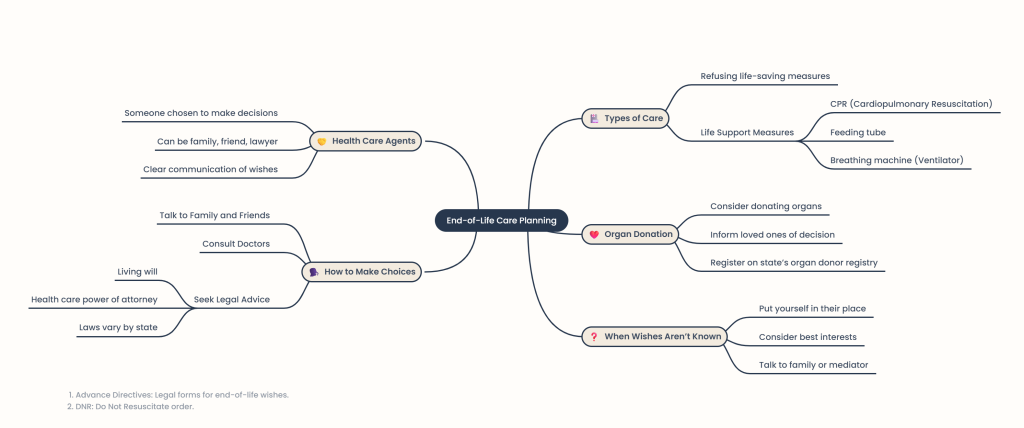
Planning for a Good Death: A Comprehensive Guide
In contemplating end-of-life care, many individuals desire a “good death,” but defining what that means can be challenging. This guide outlines the importance of planning for end-of-life care, the types of medical interventions to consider, and the steps to ensure your wishes are honored.
The Importance of Planning
Peace of Mind
Planning for end-of-life care can provide peace of mind, knowing your wishes will be respected. It alleviates the stress on loved ones who might otherwise have to guess your preferences.
Key Questions
One of the most critical questions to consider is the extent of medical treatment you wish to receive at the end of your life, particularly concerning life support measures.
Understanding Life Support Options
Life Support Overview
Life support is utilized when a body function fails, potentially prolonging life or easing pain. However, it can sometimes lead to prolonged suffering without improving quality of life.
Types of Life Support
CPR (Cardiopulmonary Resuscitation)
Used when the heart or breathing stops.
Involves chest compressions, artificial respiration, and defibrillation.
Effectiveness is higher in individuals who are generally healthy.
Feeding Tubes
Administered when a person cannot eat or drink.
Can be life-saving in certain scenarios but may not be beneficial at the end of life.
Breathing Machines (Ventilators)
Assist with breathing, often used temporarily.
At the end of life, they may prolong the dying process without providing a cure.
Making Your Wishes Known
If you prefer not to receive certain treatments, such as CPR, it’s essential to have a Do Not Resuscitate (DNR) order in place, which can be arranged through your healthcare provider.
Designating a Health Care Agent
Importance of a Health Care Agent
Choosing a health care agent is crucial for making decisions on your behalf if you become unable to do so. This person should be someone you trust and who understands your wishes.
Organ Donation Considerations
If you wish to donate your organs, inform your loved ones and consider registering with your state’s organ donor registry. This ensures your intentions are clear and can be honored.
Discussing End-of-Life Choices
Engaging Family and Friends
Starting conversations about end-of-life wishes can be difficult. Here are some strategies:
Introduce the topic through related discussions, such as updating a will.
Share your values and beliefs regarding life and death.
Choose an appropriate time and setting for these discussions, preferably when you are healthy.
Consulting with Doctors
Discussing your end-of-life choices with your healthcare provider can clarify your options and help you understand the implications of various treatments.
Legal Considerations
To formalize your wishes, consider creating advance directives:
Living Will: Specifies the type of care you wish to receive.
Health Care Power of Attorney: Names your health care agent.
Laws regarding these directives vary by state, so be aware of the regulations in your area, especially if you reside in multiple states.
Making Decisions for Others
If faced with making decisions for a loved one without a living will, reflect on their values and preferences. Consider their quality of life and consult with family members or mediators to reach a consensus.
Conclusion
Planning for a good death involves thoughtful consideration of your medical preferences and open communication with loved ones. By documenting your wishes and discussing them with family and healthcare professionals, you can ensure that your desires are respected and reduce the burden on those you leave behind.
